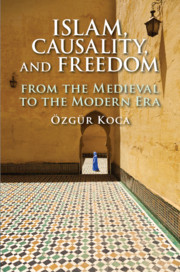Book contents
- Islam, Causality, and Freedom
- Islam, Causality, and Freedom
- Copyright page
- Dedication
- Contents
- Conventions
- Acknowledgments
- Introduction
- 1 Causality in the Early Period
- 2 Toward a Synthesis of Aristotelian and Neoplatonic Understandings of Causality
- 3 Occasionalism in the Middle Period
- 4 The First as Pure Act and Causality
- 5 Light, Existence, and Causality
- 6 The World as a Theophany and Causality
- 7 Continuities and Developments in Sufi Metaphysics
- 8 Toward an Occasionalist Philosophy of Science
- 9 Causality and Freedom in Later Islamic Philosophy
- 10 Occasionalism in the Modern Context
- 11 Islamic Theories of Causality in the Modern Context
- Conclusion
- Bibliography
- Index
5 - Light, Existence, and Causality
The Illuminationist School and the Case of Suhrawardī
Published online by Cambridge University Press: 14 May 2020
- Islam, Causality, and Freedom
- Islam, Causality, and Freedom
- Copyright page
- Dedication
- Contents
- Conventions
- Acknowledgments
- Introduction
- 1 Causality in the Early Period
- 2 Toward a Synthesis of Aristotelian and Neoplatonic Understandings of Causality
- 3 Occasionalism in the Middle Period
- 4 The First as Pure Act and Causality
- 5 Light, Existence, and Causality
- 6 The World as a Theophany and Causality
- 7 Continuities and Developments in Sufi Metaphysics
- 8 Toward an Occasionalist Philosophy of Science
- 9 Causality and Freedom in Later Islamic Philosophy
- 10 Occasionalism in the Modern Context
- 11 Islamic Theories of Causality in the Modern Context
- Conclusion
- Bibliography
- Index
Summary
The fifth chapter offers an interpretive approach to Shihāb al-Dīn Suhrawardī’s account of causality. It also examines how he establishes freedom in the created order in accordance with his understanding of causality. It is argued that Suhrawardī’s writings suggest a participatory account of causality. The chapter first examines some salient aspects of Suhrawardī’s ontology that are relevant to our discussion. The second section rethinks the question of causality with respect to Suhrawardī’s ontology. The third section discusses the question of freedom and the responsibility of moral agents in relation to Suhrawardī’s theory of causality.
- Type
- Chapter
- Information
- Islam, Causality, and FreedomFrom the Medieval to the Modern Era, pp. 100 - 115Publisher: Cambridge University PressPrint publication year: 2020

